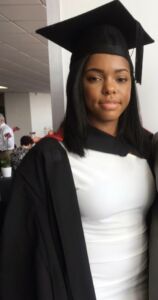Women in STEM: Natasha Lindsay (PhD)
Meet Natasha, a PhD student and TSC researcher working on the EDiTS study.
Natasha Lindsay is PhD student researching TSC and early onset epilepsy at King’s College London (KCL) alongside her role co-ordinating the Early Development in Tuberous Sclerosis (EDiTS) study – part-funded by the TSA. In this interview, she celebrates International Day of Women and Girls in Science with us and provides a unique insight to her life, and what life is like as a woman in the field of TSC research.
What was your background before becoming a TSC researcher?
Before beginning my PhD into TSC and early onset epilepsy at King’s College London, I completed a degree in BSc Psychology at the University of Sussex and worked on a number of clinical audit and research projects in in-patient mental health units.
My interest in rare genetic disorders stemmed from a work placement at University College London’s (UCL) Institute of Child Health, where I joined a team researching neurodevelopment in children and adolescents with abnormalities in their chromosomes (proteins that carry genetic information).
Did you always want to get into the field of science and research?
Since quite a young age, I have always been interested in human behaviour and finding out the answers to ‘why’ something is. Science is the pursuit of knowledge and it felt like the only subject which could answer some of my questions; why does everyone develop differently, and what factors affect human development? Taking A-Level Psychology was my first step to answering some of these questions and opened up all of the exciting possibilities related to becoming a researcher.
During my undergraduate degree I thoroughly enjoyed the modules which explored child development, individual differences and the study of atypical development (when development doesn’t follow the ‘normal’ course). I sought out work placements to harness this interest and I was lucky enough to work with a multidisciplinary team of researchers at UCL, who were researching neurodevelopment in children with rare abnormalities in their chromosomes. Alongside my role co-ordinating the Early Development in Tuberous Sclerosis (EDiTS) study at KCL, this solidified my desire to research rare genetic conditions and play an active role in improving wellbeing and outcomes for these groups of people.
A doctoral research degree has brought together my interest in cognitive and behavioural development in rare conditions, as well as my love for writing, so felt like the perfect first step!
When did you first become interested in TSC research?
In 2017 I completed a research-based work placement in which focused on the impact of genetic disorders on behaviour. This initially piqued my interest in what it means to be born with a genetic disorder such as TSC. I became fascinated by the interplay between genes and later cognitive/behavioural development in children, simply due to how little we knew about certain genetic conditions and later outcomes. Parents recruited onto the study would often ask the question “What does this mean their development?” after their child was diagnosed, and I wanted to be able to give them a clear answer!
When I joined the EDiTS study team, TSC was a condition I already had a broad knowledge of, but there were lots of things I didn’t know. From day one, I realised how rewarding and important it would be to help co-ordinate the study and contribute to improving outcomes for families and individuals with TSC.
What’s the most challenging thing, and your favourite thing, about your job?
Within the first few months of starting a PhD, it is important to carve out exactly what the scope and focus of the research will be, because often this can be the hardest part.
My project looks into developmental trajectories (the progression of a given behaviour as individuals age) and there is such a wide range of cognitive, behavioural, and psychiatric manifestations that are of interest when researching TSC. As a result, using the data to answer novel questions can be an overwhelming task, but I do feel I am getting there now.
My favourite part about my job is having the opportunity to travel to families’ homes to visit babies and young children both with and without TSC, and all the preparation that goes into this. We carry out lots of fun and engaging assessments to measure behaviour, sleep and cognition. I’m always excited to build a rapport with the families and children we see, as these are the people we are hoping our research will directly impact.
If you weren’t a researcher, what would you be doing?
I imagine I’d be a writer or produce some kind of public-facing engagement content if I was not working in research. I enjoy writing for different audiences as it allows me to be flexible and find new writing styles to engage different people. Academic writing is so different from producing recruitment adverts or participant information sheets about the study, so in that sense I have managed to incorporate what I naturally enjoy doing into my current role!
 What are your passions outside of research, in your spare time?
What are your passions outside of research, in your spare time?
I love to read and have a particular passion for dystopian novels – a bit of escapism perhaps! Aside from that I really enjoy travelling and experiencing cultures and cities which are different from my born-and-bred London life. This year, I plan on holidaying to Mykonos and Dubai, so I’m really looking forward to some sunshine and even more reading.
What can we do and how can we inspire the next generation of women in science, specifically in TSC research?
I think the key is to continue creating a community and bringing together different disciplines, charities, researchers, policy-makers and experts-by-experience to inspire and push forward TSC research.
My experience so far in researching TSC has been extremely collaborative, both by working with the TSA and with a range of other researchers and experts. Creating accessible spaces to share new research or collaborate through online seminars and conferences has worked incredibly well during the pandemic.
Having more talks or presentations geared towards early career researchers, or those interested in TSC and genetic disorders would be a great step. I think this will help us to inspire a new generation of women in science, broaden our knowledge of the condition and inspire others to get involved in this growing field.
What message would you give young girls to inspire them to pursue a career in researching a rare disease?
Take every opportunity that you can to learn more within the field of rare disease research, as there are so many resources available to harness this kind of career path. If you want to broaden your knowledge, don’t be afraid to reach out to charities, researchers, healthcare professionals and experts in the field, to ask questions and make connections.
I’d also encourage those who have the opportunity to apply for a work placement – definitely do it! There are many research-based placements on offer during an undergraduate degree, some of which are related to genetic conditions, or development in rare diseases. This will help you to make better, more informed decisions about what’s involved in carrying out research into rare conditions such as TSC and will highlight the impact you can have on the lives of those affected by the condition.
What’s in store for you in the next couple of years?
Over the next two years I will be continuing on with my PhD programme, and hopefully engage in as much collaborative work with charities and researchers as possible!
I’d love to be able to incorporate some patient and public involvement work into my PhD to ensure individuals living with and affected by TSC have the opportunity to shape the direction and impact of my work. Ultimately, the aim is for my project to contribute to our knowledge of TSC and to inform the development of early interventions to improve the long-term quality of life for patients with TSC.
Working with and having the support from charities such as TSA makes this feel all the more feasible!
Make a one off or regular donation
£10 Can allow us to send a welcome pack to a family who has just received a life-changing TSC diagnosis, ensuring that they do not go through this time alone.
£25 Can help us develop materials that are included in our support services, flagship events or campaigns.
£50 Can provide laboratory equipment for a day’s research into the causes, symptoms, management or treatment of TSC.
To provide help for today and a cure for tomorrow






